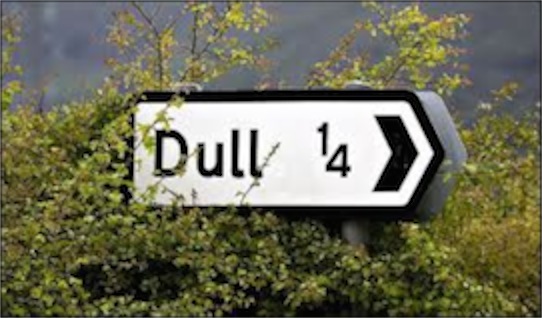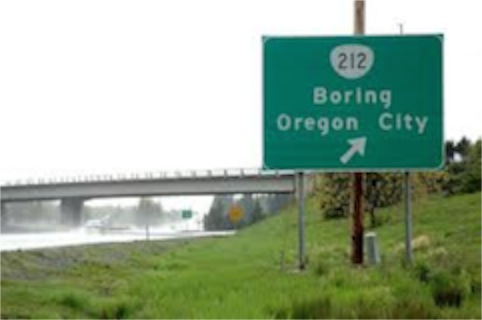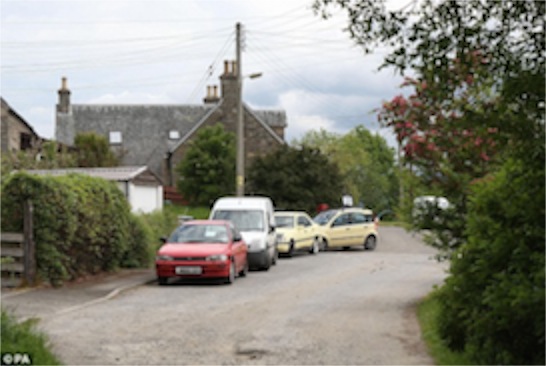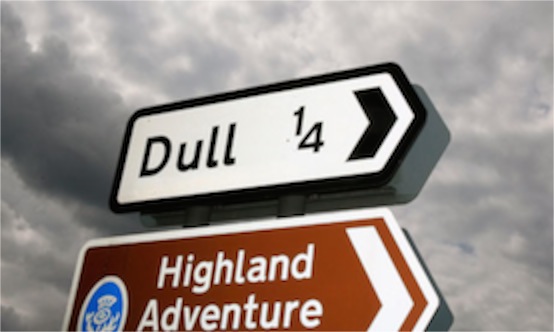From Dull to Boring
07/06/12 05:35
In the midst of all of the elections that were held Tuesday, it is possible that some people might have missed one of the west coast votes. Citizens of the town of Boring, Oregon, voted overwhelmingly to form a paring with Dull, a village in Perthshire in Scotland. Actually, it wasn’t a vote of the entire community. The action was the result of a vote of the Boring Community Planning Organization. Presumably, the majority of the meetings of the group focus on Boring business. The relationship is called a “pairing” because the two communities do not qualify for a “sister city” designation.
Here in Rapid City, we have two sister cities. Both relationships were established by official actions of the City Council in 1994. Rapid City’s relationship with Imaichi in Japan began in the early 1990’s before the official designation. In 2006, Imaichi combined with four other cities to form Nikko City, which in turn selected Rapid City as its sister city.
Rapid City is also sister city with Apolda, Germany. Several exchanges and visits have taken place between Apolda and Rapid City, including exchanges of firefighters, law enforcement and medical personnel. Rapid City has official associations to promote the sister city relationships with Apolda and Nikko City.
Boring and Dull cannot have a sister city relationship. The rules of the sister cities association require that communities be of a similar size in order to be sister cities. Dull boasts 84 residents. 12,000 people call Boring their home. When it comes to numbers, more people are attracted to Boring than to Dull.


I’m not sure about this, but one gets the impression that folks are getting excited in both places about their new relationship. One wonders what might be the result of Boring and Dull people getting excited. Planners hope that the pairing will result in increased tourism for both cities. The possibilities of such tourism seem limitless:
“Where did you go on your vacation?”
“Um . . . Just a minute, I’ll remember . . . Oh! It was Boring!”
“How was your trip to Scotland?”
“Well, it was Dull.”
If conversations like those don’t spark increased tourism, I don’t know what will.
 Residents of Dull are hoping that the paring might result in a new sign. According to Marjorie Keddle, chairperson of the Dull and Weem Community Council, the community plans to get together with the Perth and Kiniross Council to make an appeal for a new sign. They are hoping to get the names of both cities on their new sign. Right now the city has only a sing that says, “Dull ¼.” Just imagine how many more tourists might flock into the community if the sign said “Dull and Boring.” It is enough to get Dull and Boring people excited.
Residents of Dull are hoping that the paring might result in a new sign. According to Marjorie Keddle, chairperson of the Dull and Weem Community Council, the community plans to get together with the Perth and Kiniross Council to make an appeal for a new sign. They are hoping to get the names of both cities on their new sign. Right now the city has only a sing that says, “Dull ¼.” Just imagine how many more tourists might flock into the community if the sign said “Dull and Boring.” It is enough to get Dull and Boring people excited.
OK, it is a cheap shot to make fun of the names of the towns. After all, each has a rich and varied history.
The city of Boring, Oregon, was named in honor of one of its early residents, William Boring. It seems that there were several people with that name. William Alciphron Boring (1859-1937) was an American architect. He was one of the codesigners of the Immigration Station at Ellis Island iin New York Harbor. He is also credited with the design of the American Seamen’s Friend Society Sailors’ Home and Institute in New York City. Both buildings feature red brick with extensive use of granite. New York City also boasts several Boring apartment buildings and a Boring school. There is even a Boring warehouse in that city. But that Willima Boring is not the same William Boring for whom the city in Oregon is named. I couldn’t find much information about William H. Boring, who was a Union Veteran who was mustered out of the Illinois Infantry in 1865 due to a disability after serving for approximately 4 years during the Civil War. He moved west and settled in an Oregon timber town that eventually was named for him. There just doesn’t seem to be much information about him other than his military records. I guess after the excitement of the War, the rest of his life was, well . . . boring.
In Scotland, the reason for the name of Dull is not quite as clear. The place has had that name for a long time and the most popular theory is that the city was named for a word of the ancient Pictish language. In that language, dull means “field.” Dull is, after all, pretty much out in the fields.
The idea for the partnership of the two communities did not originate with the residents of either town. Elizabeth Leighton lives in Aberfeldy, a town near to Dull in Scotland. Ms. Leighton decided to take a bicycling vacation in the United States. On her trip she passed through Boring, Oregon. She w as so excited to discover the town that she immediately phoned her friend Emma Burtles, a resident of Dull. Together they came up with the idea of linking the two communities. Aberfeldy posted pictures of the community signs on her Facebook page and within weeks dozens of people had viewed her photos.
The main businesses in Dull are guest lodges and chalets. Tourists come to the area for a bit of vacation and down time. Highland Safaris also operates out of the town and caters to the tourist market. Recently residents of the village noticed that four cyclists from overseas stopped in their town. They were on a trip from John O Groats to Lands End. Dull wasn’t on their original route, but they decided to change their plans in order to be able to say that they had cycled to Dull and beyond.
 An official street party is planned for Saturday, June 23, in Dull. All of the citizens of Dull are invited. It is hoped that a few Boring people will also be on hand for the party. It should be quite an affair.
An official street party is planned for Saturday, June 23, in Dull. All of the citizens of Dull are invited. It is hoped that a few Boring people will also be on hand for the party. It should be quite an affair.
And who knows? Perhaps the Dull people will get a new sign. They are hoping that it will say, “Dull, in association with Boring.” That ought to really bring the tourists. After all, it sounds like a dream vacation.
Here in Rapid City, we have two sister cities. Both relationships were established by official actions of the City Council in 1994. Rapid City’s relationship with Imaichi in Japan began in the early 1990’s before the official designation. In 2006, Imaichi combined with four other cities to form Nikko City, which in turn selected Rapid City as its sister city.
Rapid City is also sister city with Apolda, Germany. Several exchanges and visits have taken place between Apolda and Rapid City, including exchanges of firefighters, law enforcement and medical personnel. Rapid City has official associations to promote the sister city relationships with Apolda and Nikko City.
Boring and Dull cannot have a sister city relationship. The rules of the sister cities association require that communities be of a similar size in order to be sister cities. Dull boasts 84 residents. 12,000 people call Boring their home. When it comes to numbers, more people are attracted to Boring than to Dull.


I’m not sure about this, but one gets the impression that folks are getting excited in both places about their new relationship. One wonders what might be the result of Boring and Dull people getting excited. Planners hope that the pairing will result in increased tourism for both cities. The possibilities of such tourism seem limitless:
“Where did you go on your vacation?”
“Um . . . Just a minute, I’ll remember . . . Oh! It was Boring!”
“How was your trip to Scotland?”
“Well, it was Dull.”
If conversations like those don’t spark increased tourism, I don’t know what will.

OK, it is a cheap shot to make fun of the names of the towns. After all, each has a rich and varied history.
The city of Boring, Oregon, was named in honor of one of its early residents, William Boring. It seems that there were several people with that name. William Alciphron Boring (1859-1937) was an American architect. He was one of the codesigners of the Immigration Station at Ellis Island iin New York Harbor. He is also credited with the design of the American Seamen’s Friend Society Sailors’ Home and Institute in New York City. Both buildings feature red brick with extensive use of granite. New York City also boasts several Boring apartment buildings and a Boring school. There is even a Boring warehouse in that city. But that Willima Boring is not the same William Boring for whom the city in Oregon is named. I couldn’t find much information about William H. Boring, who was a Union Veteran who was mustered out of the Illinois Infantry in 1865 due to a disability after serving for approximately 4 years during the Civil War. He moved west and settled in an Oregon timber town that eventually was named for him. There just doesn’t seem to be much information about him other than his military records. I guess after the excitement of the War, the rest of his life was, well . . . boring.
In Scotland, the reason for the name of Dull is not quite as clear. The place has had that name for a long time and the most popular theory is that the city was named for a word of the ancient Pictish language. In that language, dull means “field.” Dull is, after all, pretty much out in the fields.
The idea for the partnership of the two communities did not originate with the residents of either town. Elizabeth Leighton lives in Aberfeldy, a town near to Dull in Scotland. Ms. Leighton decided to take a bicycling vacation in the United States. On her trip she passed through Boring, Oregon. She w as so excited to discover the town that she immediately phoned her friend Emma Burtles, a resident of Dull. Together they came up with the idea of linking the two communities. Aberfeldy posted pictures of the community signs on her Facebook page and within weeks dozens of people had viewed her photos.
The main businesses in Dull are guest lodges and chalets. Tourists come to the area for a bit of vacation and down time. Highland Safaris also operates out of the town and caters to the tourist market. Recently residents of the village noticed that four cyclists from overseas stopped in their town. They were on a trip from John O Groats to Lands End. Dull wasn’t on their original route, but they decided to change their plans in order to be able to say that they had cycled to Dull and beyond.

And who knows? Perhaps the Dull people will get a new sign. They are hoping that it will say, “Dull, in association with Boring.” That ought to really bring the tourists. After all, it sounds like a dream vacation.